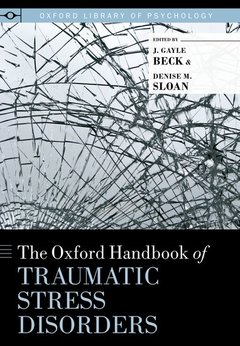The Oxford Handbook of Traumatic Stress Disorders Oxford Library of Psychology Series
Langue : Anglais
Coordonnateurs : Beck J. Gayle, Sloan Denise M.

The experience of traumatic events is a near-universal, albeit unfortunate, part of the human experience. Given how many individuals are exposed to trauma, it is interesting to question why some individuals are resilient in the face of trauma while others go on to develop chronic post-traumatic stress. Throughout the relatively brief history of the psychological study of trauma, a number of themes have consistently emerged; many of these themes remain essential elements within our current study of traumatic stress disorders, as summarized within this volume. The Oxford Handbook of Traumatic Stress Disorders addresses the current landscape of research and clinical knowledge surrounding traumatic stress disorders. Bringing together a group of highly-regarded experts, this volume is divided into six sections, together summarizing the current state of knowledge about 1) classification and phenomenology, 2) epidemiology and special populations, 3) contributions from theory, 4) assessment, 5) prevention and early intervention efforts, and 6) treatment of individuals with post-trauma mental health symptoms. Throughout the volume, attention is paid to identifying current controversies in the literature and highlighting directions that hold promise for future work.
Part One: Introduction to the volume. 1. Traumatic Stress Disorders: Historical context and current focus. J. Gayle Beck and Denise M. Sloan. Part Two: Classification and Phenomenology. 2. Defining traumatic events: Research findings and controversies. Jesse R. Cougle, Dean G. Kilpatrick, and Heidi Resnick. 3. Classification of Acute Stress Disorder. Maria L. Pacella and Douglas L. Delahanty. 4. Classification of Posttraumatic Stress Disorder. Tali Manber Ball and Murray B. Stein. 5. Future of Classification in Post Traumatic Stress Disorder. Terence M. Keane, Ph.D. aamp, Mark W. Miller, Ph.D.. Part Three: Epidemiology and Special Populations. 6. The Epidemiology of Acute Stress Disorder and Other Early Responses to Trauma in Adults. Quinn M. Biggs, Jennifer M. Guimond, Carol S. Fullerton, Robert J. Ursano, ASD Workgroup* Christine Gray, Matthew Goldenberg, Dori Reissman, James E. McCarroll, Patcho Santiago, Mary P. Tyler. 7. Epidemiology of Post-Traumatic Stress Disorder in Adults. Naomi Breslau. 8. Traumatic Stress Disorders in Children and Adolescents. Annette M. La Greca, Cortney J. Taylor, Whitney M. Herge. 9. Traumatic Stress in Older Adults. Joan M. Cook, Tatyana Biyanova, Diane L. Elmore. 10. Traumatic Stress in Special Populations. Kim T. Mueser and Weili Lu. Part Four: Contributions from Theory. 11. Genetics and Genomics of Post-traumatic Stress Disorder. Monica Uddin, Ananda B. Amstadter, Nicole R. Nugent, Karestan C. Koenen. 12. Biological Contributions to PTSD: Differentiating normative from pathological response. Rachel Yehuda, Laura Pratchett, Michelle Pelcovitz. 13. Learning Models of PTSD. Shmuel Lissek and Christian Grillon. 14. Information Processing in Posttraumatic Stress Disorder. Anke Ehlers, Thomas Ehring, and Birgit Kleim. 15. Family Models of Posttraumatic Stress Disorder. Candice M. Monson, Steffany J. Fredman, Rachel Dekel, Alexandra Macdonald. Part Five: Assessment. 16. Assessing PTSD Symptoms. Michelle J. Bovin and Frank W. Weathers. 17. Assessing Acute Traumatic Stress Symptoms. Richard A. Bryant, PhD. 18. Assessing trauma-related symptoms in children and adolescents. Sonja March, Alexandra De Young, Belinda Dow, and Justin Kenardy. 19. Psychometric concerns in the assessment of trauma-related symptoms in older adults. Willeke H. van Zelst and Aartjan T.F. Beekman. 20. Assessment of PTSD in Non-Western Cultures: The Need for New Contextual and Complex Perspectives. Boris Dro%z?ek, John P. Wilson, and Silvana Turkovic, Ph.D.. 21. Assessing PTSD-related Functional Impairment and Quality of Life. Darren W. Holowka and Brian P. Marx. Part Six: Prevention/Early Intervention. 22. Risk and Protective Factors for Traumatic Stress Disorders. Lynda A. King, Anica P. Pless, Jennifer L. Schuster, Carrie M. Potter, Crystal L. Park, Avron Spiro, III, Daniel W. King. 23. Community-Based Early Intervention with Trauma Survivors. Josef I. Ruzek, Ph.D.. 24. Individual Approaches to Prevention and Early Intervention. Teresa M. Au, Caroline Silva1, Eileen M. Delaney, and Brett T. Litz. 25. Prevention and Early Intervention Programs for Children and Adolescents. Melissa J. Brymer, Alan M. Steinberg, Patricia J. Watson, and Robert S. Pynoos. 26. Prevention and Early Intervention Programs for Older Adults. Martha Stra
J. Gayle Beck, Ph.D., is the Lillian and Morrie Moss Chair of Excellence, Department of Psychology, University of Memphis. Denise M. Sloan, Ph.D., is Associate Professor of Psychiatry, Boston University School of Medicine.
Date de parution : 03-2012
Ouvrage de 576 p.
18.6x25.5 cm
Thème de The Oxford Handbook of Traumatic Stress Disorders :
© 2024 LAVOISIER S.A.S.



